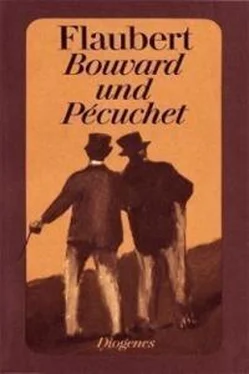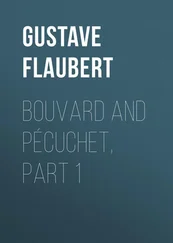Pécuchet answered: "Yet the stomach is made to digest, the leg to walk, the eye to see, although there are dyspepsias, fractures, and cataracts. No arrangements without an end. The effects came on at the exact time or at a later period. Everything depends on laws; therefore, there are final causes."
Bouvard imagined that perhaps Spinoza would furnish him with some arguments, and he wrote to Dumouchel to get him Saisset's translation.
Dumouchel sent him a copy belonging to his friend Professor Varelot, exiled on the 2nd of December.
Ethics terrified them with its axioms, its corollaries. They read only the pages marked with pencil, and understood this:
"'The substance is that which is of itself, by itself, without cause, without origin. This substance is God. He alone is extension, and extension is without bounds.'"
"What can it be bound with?"
"'But, though it be infinite, it is not the absolute infinite, for it contains only one kind of perfection, and the Absolute contains all.'"
They frequently stopped to think it out the better. Pécuchet took pinches of snuff, and Bouvard's face glowed with concentrated attention.
"Does this amuse you?"
"Yes, undoubtedly. Go on forever."
"'God displays Himself in an infinite number of attributes which express, each in its own way, the infinite character of His being. We know only two of them—extension and thought.
"'From thought and extension flow innumerable modes, which contain others. He who would at the same time embrace all extension and all thought would see there no contingency, nothing accidental, but a geometrical succession of terms, bound amongst themselves by necessary laws.'"
"Ah! that would be beautiful!" exclaimed Bouvard.
"'If God had a will, an end, if He acted for a cause, that would mean that He would have some want, that He would lack some one perfection. He would not be God.
"'Thus our world is but one point in the whole of things, and the universe, impenetrable by our knowledge, is a portion of an infinite number of universes emitting close to ours infinite modifications. Extension envelops our universe, but is enveloped by God, who contains in His thought all possible universes, and His thought itself is enveloped in His substance.'"
It appeared to them that this substance was filled at night with an icy coldness, carried away in an endless course towards a bottomless abyss, leaving nothing around them but the Unseizable, the Immovable, the Eternal.
This was too much for them, and they renounced it. And wishing for something less harsh, they bought the course of philosophy, by M. Guesnier, for the use of classes.
The author asks himself what would be the proper method, the ontological or the psychological.
The first suited the infancy of societies, when man directed his attention towards the external world. But at present, when he turns it in upon himself, "we believe the second to be more scientific."
The object of psychology is to study the acts which take place in our own breasts. We discover them by observation.
"Let us observe." And for a fortnight, after breakfast, they regularly searched their consciousness at random, hoping to make great discoveries there—and made none, which considerably astonished them.
"'One phenomenon occupies the ego, viz., the idea. What is its nature? It has been supposed that the objects are put into the brain, and that the brain transmits these images to our souls, which gives us the knowledge of them.'"
But if the idea is spiritual, how are we to represent matter? Thence comes scepticism as to external perceptions. If it is material, spiritual objects could not be represented. Thence scepticism as to the reality of internal notions.
"For another reason let us here be careful. This hypothesis will lead us to atheism."
For an image, being a finite thing, cannot possibly represent the Infinite.
"Yet," argued Bouvard, "when I think of a forest, of a person, of a dog, I see this forest, this person, this dog. Therefore the ideas do represent them."
And they proceeded to deal with the origin of ideas.
According to Locke, there are two originating causes—sensation and reflection; and Condillac reduces everything to sensation.
But then reflection will lack a basis. It has need of a subject, of a sentient being; and it is powerless to furnish us with the great fundamental truths: God, merit and demerit, the Just, the Beautiful—ideas which are all innate , that is to say, anterior to facts, and to experience, and universal.
"If they were universal we should have them from our birth."
"By this word is meant dispositions to have them; and Descartes―"
"Your Descartes is muddled, for he maintains that the foetus possesses them, and he confesses in another place that this is in an implied fashion."
Pécuchet was astonished. "Where is this found?"
"In Gérando." And Bouvard tapped him lightly on the stomach.
"Make an end of it, then," said Pécuchet.
Then, coming to Condillac:
"'Our thoughts are not metamorphoses of sensation. It causes them, puts them in play. In order to put them in play a motive power is necessary, for matter of itself cannot produce movement.' And I found that in your Voltaire," Pécuchet added, making a low bow to him.
Thus they repeated again and again the same arguments, each treating the other's opinion with contempt, without persuading his companion that his own was right.
But philosophy elevated them in their own estimation. They recalled with disdain their agricultural and political preoccupations.
At present they were disgusted with the museum. They would have asked nothing better than to sell the articles of virtù contained in it. So they passed on to the second chapter: "Faculties of the Soul."
"'They are three in number, no more: that of feeling, that of knowing, and that of willing.
"'In the faculty of feeling we should distinguish physical sensibility from moral sensibility. Physical sensations are naturally classified into five species, being transmitted through the medium of the senses. The facts of moral sensibility, on the contrary, owe nothing to the body. What is there in common between the pleasure of Archimedes in discovering the laws of weight and the filthy gratification of Apicius in devouring a wild–boar's head?
"'This moral sensibility has five genera , and its second genus, moral desires, is divided into five species, and the phenomena of the fourth genus, affection, are subdivided into two other species, amongst which is the love of oneself—a legitimate propensity, no doubt, but one which, when it becomes exaggerated, takes the name of egoism.
"'In the faculty of knowing we find rational perception, in which there are two principal movements and four degrees.
"'Abstraction may present perils to whimsical minds.
"'Memory brings us into contact with the past, as foresight does with the future.
"'Imagination is rather a special faculty, sui generis .'"
So many intricacies in order to demonstrate platitudes, the pedantic tone of the author, and the monotony of his forms of expression—"We are prepared to acknowledge it," "Far from us be the thought," "Let us interrogate our consciousness"—the sempiternal eulogy on Dugald Stewart; in short, all this verbiage, disgusted them so much that, jumping over the faculty of willing, they went into logic.
It taught them the nature of analysis, synthesis, induction, deduction, and the principal causes of our errors.
Nearly all come from the misuse of words.
"The sun is going to bed." "The weather is becoming brown," "The winter is drawing near"—vicious modes of speech which would make us believe in personal entities, when it is only a question of very simple occurrences. "I remember such an object," "such an axiom," "such a truth"—illusion! These are ideas and not at all things which remain in me; and the rigour of language requires, "I remember such an act of my mind by which I perceived that object," "whereby I have deduced that axiom," "whereby I have admitted this truth."
Читать дальше








![Гюстав Флобер - Закат Карфагена [Сборник]](/books/414440/gyustav-flober-zakat-karfagena-sbornik-thumb.webp)


